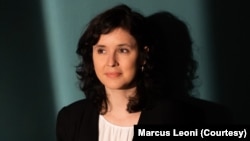Three years ago, Gabriela Sa Pessoa was at Brazil’s National Congress, covering the inauguration of President Jair Bolsonaro for the influential daily Folha de S.Paulo.
The journalist said her experiences that day shaped her forever.
“Hundreds of supporters were insulting me,” Pessoa told VOA. “It was one of the most difficult days ... in all of my career.”
For the Sao Paulo-based journalist, what she remembers most is her conversations with the crowd.
“After insulting me, saying the most filthy things on Earth about me, when I turned off the recorder, they just said, ‘OK, I’m sorry. It’s nothing personal. I have daughters, I have sisters, I have a mother. I know you’re a woman. But, you know, it’s part of the game,’” Pessoa said. “They even apologized, literally seconds after insulting me.”
The incident taught her a lasting lesson about interacting with people as a journalist — and the difficulty of being a woman and a journalist in Brazil.
“At the end of the day, we’re all humans,” Pessoa said. “We are dealing, every time, with people. We just need to be there, look them in the eyes, and hear whatever they have to say.”
A journalist for 10 years, Pessoa is currently a news researcher for the Washington Post, working alongside the Rio de Janeiro bureau chief Terrence McCoy to cover human rights violations and environmental issues in the Amazon.
That work contributed to her last month being named the International Women’s Media Foundation 2023 Elizabeth Neuffer Fellow.
Environmental issues and rights are “probably the most important topic of our time,” Nadine Hoffman, deputy director of the IWMF, told VOA. “The fact that [Pessoa is] focusing on the intersection of human rights and climate was what set her apart from the other candidates.”
During the fellowship, which spans seven months, Pessoa will investigate deforestation in the Amazon, with a focus on indigenous communities.
Pessoa hopes that the opportunity to work in the U.S. during the fellowship will help her to pursue an international lens to report on the Amazon.
One area she is keen to investigate is illegal mining and the American companies that are “big buyers of products related to deforestation.”
“Things don’t happen here [in Brazil] alone,” Pessoa said. “The products that come out of the forest illegally — they have to go somewhere, and they go to many countries such as the United States.”
Media impact
For Pessoa, the ability of journalism to bring change is one of the most inspiring aspects of her work.
One of her proudest moments was the reaction to a 2015 article she contributed to for the investigative outlet, Agência Pública de Jornalismo Investigativo, on the lack of access to abortion, which is legal in some circumstances in Brazil.
After the article was published, federal prosecutors opened an investigation, a public campaign launched to ensure women knew their rights and a hotline offered help for people unable to find support when seeking abortion.
“This is the proudest a journalist can be: changing reality. Really, really changing something for our women,” Pessoa said.
Another important aspect is the human story. When thinking about climate change, Pessoa said, those who come to mind are indigenous women leaders or relatives of those killed in the Amazon, but who continue their activism.
Indigenous people patrol their lands in the Amazon to protect from illegal loggers. Between 2009 and 2019, more than 300 people have been killed — many by illegal loggers — in conflicts over land and resources in the Amazon, according to the Pastoral Land Commission, a nonprofit that tracks cases.
“I always think of the women that lose their husbands, their sons, to the violent war happening in the Amazon these days,” Pessoa said. “It’s a hard question and a really important one. How the hell do they manage to carry on and keep fighting for the forest?”
Critical issues
Hoffman, of the IWMF, said that Pessoa’s climate coverage aligns with the fellowship’s mission of honoring Elizabeth Neuffer’s commitment to critical issues of her time.
Named in memory of Neuffer, a Boston Globe correspondent who died in a car accident while on assignment in Iraq in 2003, the fellowship focuses on social justice and human rights issues.
Over 130 candidates from 51 countries applied for the 2023 program which involves a period of research at MIT and internships with the Boston Globe and the New York Times.
Pessoa considers the fellowship not just an honor for her, but a win for young female journalists, especially in Brazil.
Threats and violence directed at women, including journalists and activists, are among the concerns cited by the U.S. State Department 2021 country report on Brazil.
The State Department and think tanks note some progress, with a new law against violence directed at women to hinder or restrict political rights, and a growing number of female candidates elected to office. But as a Wilson Center report from 2019 said, violence and threats directed at women are “an urgent human rights issue” affecting tens of millions of women and girls in Brazil.
“It’s so hard for us here. And being a woman — being a journalist in these times — we’re always being insulted by the authorities, we are under so much,” Pessoa said. “This is for us. This is for all of them.”
